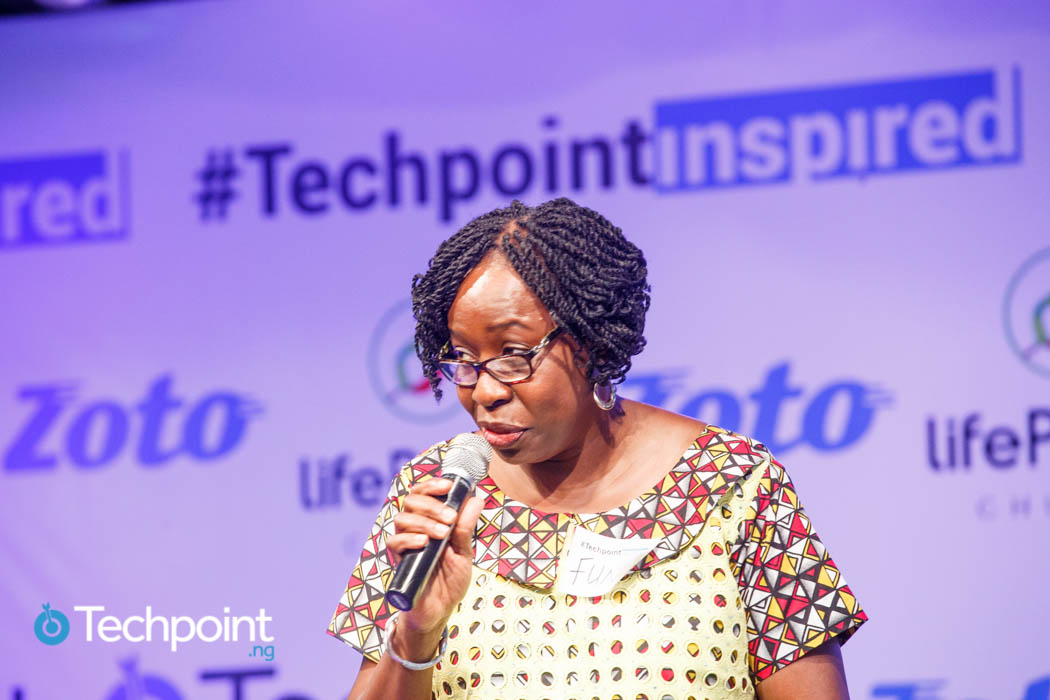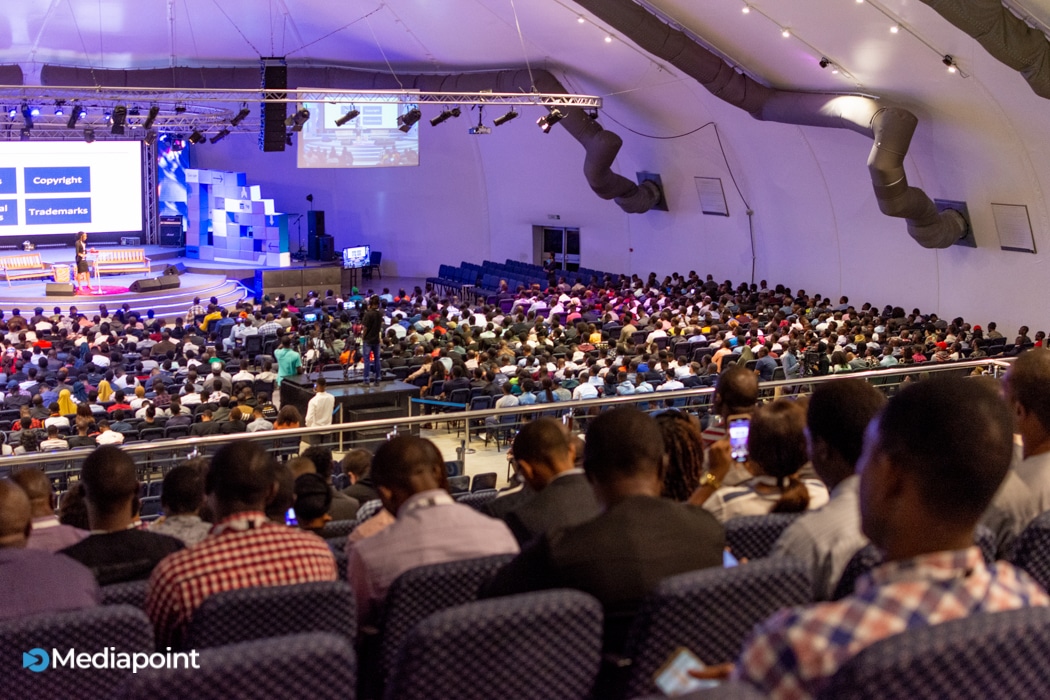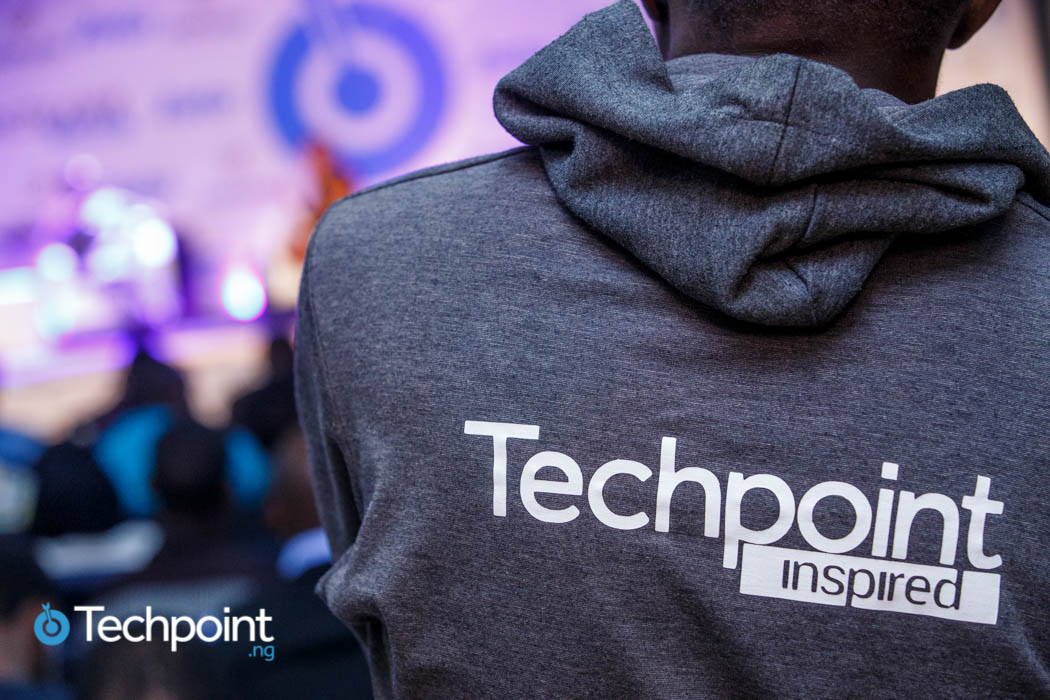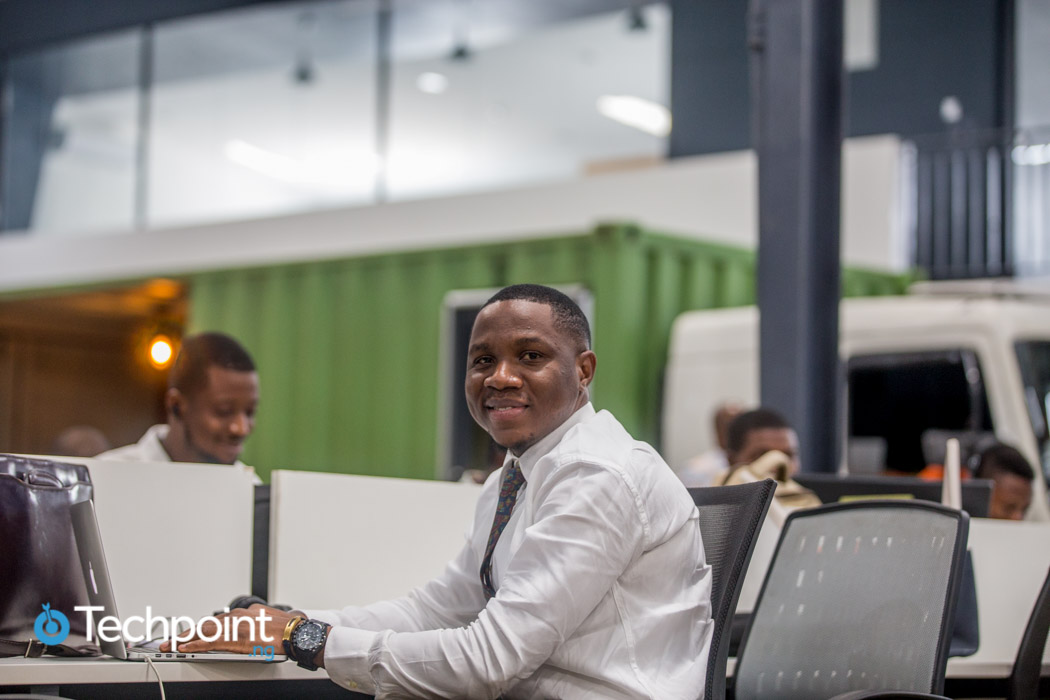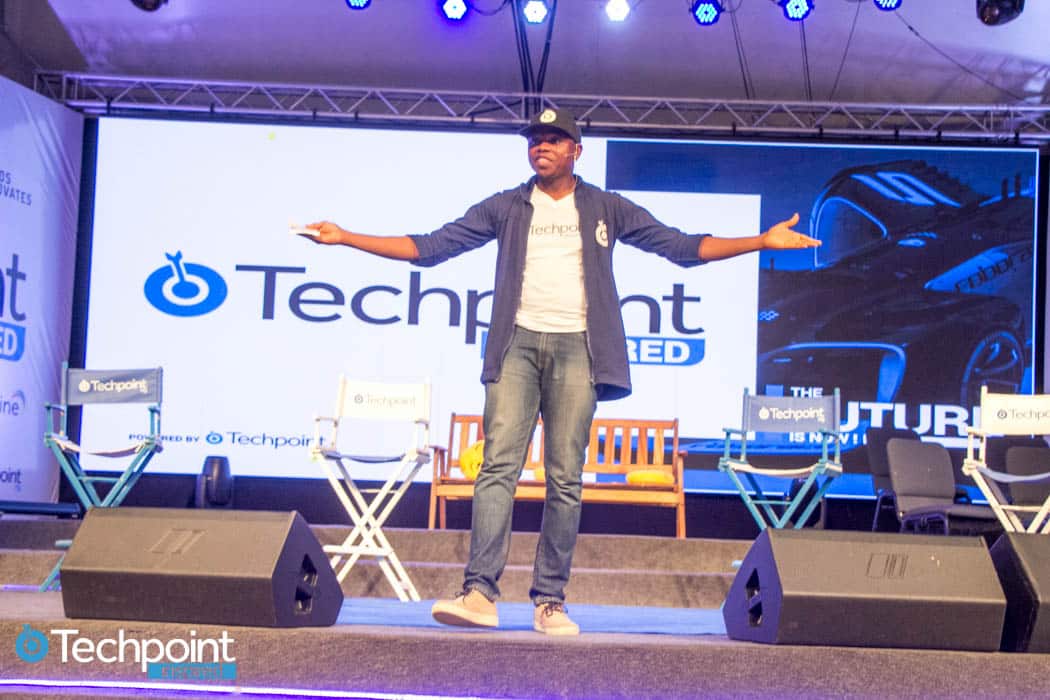Editor’s Note: The following is a partially-edited full text transcript of the keynote address given by MainOne CEO, Funke Opeke on “Entrepreneurship: The way forward for Nigeria” during the maiden edition of Techpoint Inspired, which held on the 29th of May, 2017 and was sponsored by Zoto.com.ng — a simple, fast and secure way to buy airtime.
Happy Democracy Day everyone and thank you very much for that very kind introduction. It’s great to see so many people and those who have gone ahead of myself.
So delighted to see Mrs. Cecilia Ibru in the audience. I remember years ago when we were trying to privatise NITEL and we reached out to you. You did offer me assistance and, I think as a younger woman, pulled me close to you as a professional. I am ever grateful for that. Thank you very much madam.
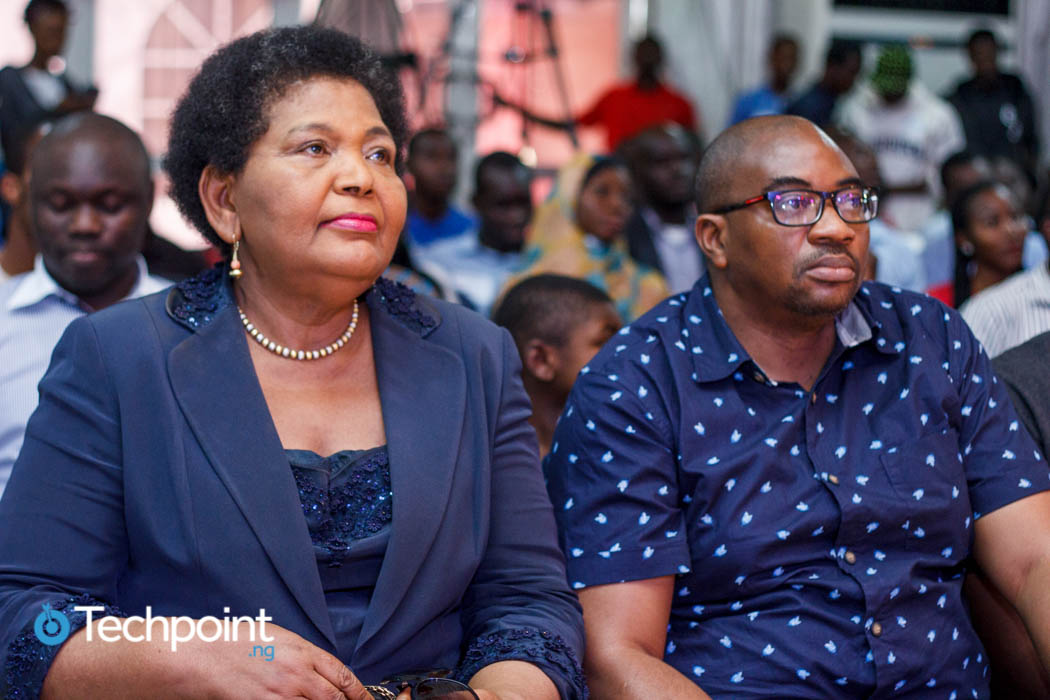
And I think that’s a wonderful thing about our society; the ability of us all as Nigerians on a day like this to pull ourselves together for the improvement of ourselves and for the improvement and development of our economy.
And it is, you know, each one pull one, pull many as you can in your circle of influence that will ultimately make a difference.
So, “Entrepreneurship: The way forward”. What I’d like to do is take the time to tell a little bit of my story and how I got here, talk about the road, some of the challenges, the opportunities, what I see and then I’ll leave a few minutes for some Q&A so we get the opportunity to get some questions in.
My story — born in Ibadan, [went to] Queen School and what is now Obafemi Awolowo University, [did] my Youth Service and then I went to the United States for a master’s degree. At the time I was leaving, Nigeria was going through some structural adjustment. It was in the early 80s — similar times — the opportunities were few and far between. I decided to stay on — because there were no jobs for me to come back to in Nigeria after my master’s degree — in the United States and pursue my career opportunity.
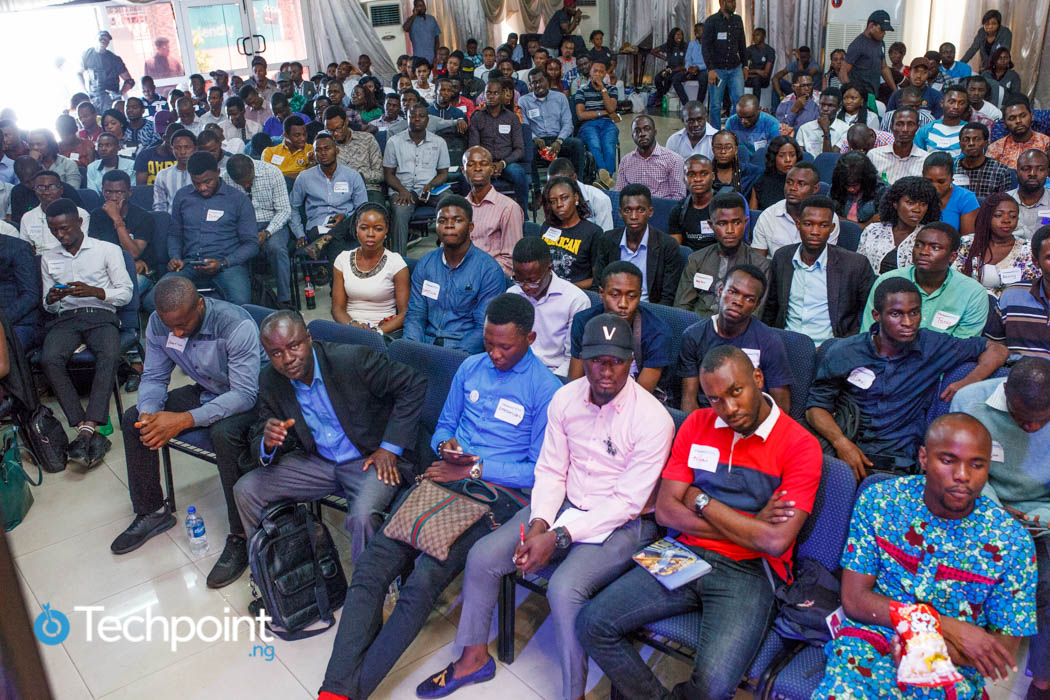
Fast forward, about 23 additional years later, after my graduating from my master’s program, opportunities in telecommunications, which is the space I was in, started opening up with liberalisation in Nigeria and I had the opportunity to meet the leadership of MTN who interviewed me and brought me back to Nigeria as Chief Technical Officer.
Now, I had not worked in Nigeria for more than 20 years since my Youth Service and it was a really difficult adjustment. I also felt, as a Nigerian who was coming back to give back to Nigeria, it just was not the right platform for me to give back in the way I wanted to. So, I thought we needed more infrastructure, there’s still a fundamental problem with infrastructure, this infrastructure is not capable of serving the needs of the number of people we have in the country with quality and affordable price.
And so we took on NITEL, and I was approached to look at how we could privatise NITEL and make it an institution that would work for all Nigerians. We tried at that or about a year and unfortunately, you get to learn through trying to privatise a government agency in partnership with government a lot of why Nigeria doesn’t work.
But in all these times I was back in Nigeria the internet, which really had taken off during my career in the United States, was continuing to explode globally and we barely had access to the internet in Nigeria. And I knew some of the critical infrastructure that was missing, so I had met Mr. Fola Adeola where we were trying to privatise NITEL and he said “oh well, I will help you to start a business, you have to do something that reflects your values why don’t you go out and try to do that?” I came back and said “I really think we need a submarine cable, a private submarine cable so we could connect Nigeria and West Africa better with the rest of the world.”
And he said “you’ve got to be crazy, how much is that?” I said $300 million and he said “What? No that’s what government does or big companies like MTN. We are not going to take that on. “
And I said well give me some time let me come back to you but I really think that’s what we need to do and that’s the gap here and that’s where the opportunity lies. Anyway, cut a long story short, we raised $240 million, we built the cable from 2008 to 2010 and we put the submarine cable in service. That submarine cable.. [APPLAUSE] … it was the first private submarine cable to be landed in Africa. Served all the major telcos except Glo, which was also building their cable and came in shortly after us, even then we’ve provided services to them till today.
So, providing service to MTN, Airtel, Etisalat and all the smaller ISPs essentially starting off the data revolution in Nigeria. We do the same in Ghana, where we are serving all the large operators and in addition, we are delivering data capacity into about 8 countries across West Africa today.
So that is my personal story [APPLAUSE], I thought when MainOne went into service that I would kick back and relax because there would be so much demand for data and we wouldn’t have to push the business but the demand would self-generate revenue for us. We put in place structures to operate the business efficiently and I thought it would be a picnic. But I’ve never had to work harder than I have subsequent to the cable going into service than I actually had before the cable getting in.

But clearly, when I look at the story of Nigeria and I look at what I set out to do, which I could not have done with some very good mentors and leadership, I think it’s what fuels the need for entrepreneurship in our society. There is so much opportunity, there is so much need here that we need to transform our society, when you look around us. No one is going to do it for us and we also have to get our government on board with us to meet the aspirations of Nigerians because that’s what democracy is all about.
But especially on a day like this when we look at how are we going to address the problems, I like that some of the issues that were raised and some of the elevator pitches talked about education. When you talk about education, when you talk about feeding, when you talk about healthcare, when you talk about all kinds of services, transportation, unless we start addressing them as Nigerians, there is no manna from heaven.
And then there are some large infrastructure areas like power that we still need addressed as well. So it really calls for the need for entrepreneurship. I met one of the, this morning, a chairman of one the privatised power companies already, and we were talking about the challenges they face as a private companies and has Nigerians who have taken those companies on and how difficult it is and how really only Nigerians can take on those challenges and meaningfully address them.
You know, expatriates who come to this country for an opportunity, presumably an easier opportunity than the countries they are coming from, are not going to deal with those issues. And what he said is, it’s like dealing with a leaky bucket; you are plugging one and the other one is leaking. And he says we are doing that all the time, it is very draining physically to do that. But really, we as Nigerians are the ones who are going to take these opportunities, take the bulls by the horn especially at times like this when there is no capacity in the system.
I think for many years, and being in business in Nigeria, has really given cause to reflect on the challenges of Nigeria, to see where we are. And it’s because we had trickled down. Some of the economists of today say that it’s because we had almost too much. The oil money was being share from the top so there was no incentive, no incentive to add value, no incentive to address the basic needs. When one of those holes were leaking the government just took some oil money and put a short-term panacea to address our problems rather than really thinking creatively and getting the best of us as Nigerians to address those problems and putting sustainable solutions.
And so that’s a cry for entrepreneurship today, we talk about oil and the declining oil economy. Oil is declining. The usage of power in advanced market is declining because they’re getting more energy efficient and they are providing more energy of their own because they have those same resources. So it is going to be up to us to start looking at areas of need not just in Nigeria but on a global basis and organising ourselves and putting our skills together and our resources together in order to create that value which is what an entrepreneur does and in return for that value then you accumulate wealth and you start providing capital to feed other businesses.

So I’m going to start my narrative on the issues of capital. I always tell people, “raising money is the most difficult thing I ever did as an entrepreneur”. In this environment today, raising money is the most difficult thing I ever did.
Every entrepreneur has to raise capital. If your business is going to grow, you have to raise capital. You have to be smart about raising capital, you have to be determined about raising capital. But what I also found about raising capital in Nigeria is, because of the informality of our society, you actually have more informal structures to raise capital to get started, if you are pragmatic and realistic, than you have in a more advance market.
In advance markets, you want to start a small business, you write the business plan you go to the bank. In Nigeria, you write the business plan, you start doing your business you show some real commitment, passion, the ability to execute and then you go to parents and family and try to raise your capital.
You have friends and family and you can raise capital. For me at MainOne, the first money we raised was $3.2 million and we raised it from friends and family. You don’t need $3.2 million, and I see a lot of young… you don’t always need $3.2 million, no, We were doing a project that ultimately was $240 million. But that $3.2 million was some of the most difficult money I raised, which was just over 1.5% of what we required.
But what I said is it was like you started climbing a hill and you are on the incline you couldn’t go back. So once you started, you had to get to the top of the hill, and that’s really what I did. But what I find with a lot of young entrepreneurs — it’s the same thing — you write your prospectus, you shop around your business plan, you deal with valuation, you need to be pragmatic you, you need to continue executing. The kind of capital you take, the terms under which you take that capital could kill you.
And then the thing I always realised was, it was the results I was getting that allowed me to raise that capital. So, some people just say maybe if I could get this big pot of money, then I could execute. What I see from the entrepreneurs who I see succeeding are they continue executing and they use a resourcefulness to demonstrate capacity. And it’s that capacity that ultimately brings the capital they need to the business. People are investing because they think they can put money in your business and make that money back. And that is the story of capital.
So, capital is really difficult in our environment. You have to execute, raising capital is probably going to be something you’ll live with for a very long time, so don’t expect quick fixes. But if you are getting the results and you are demonstrating the capacity to generate wealth and pay in return, then you will ultimately raise the capital. And it may not be the first offer that comes calling but eventually you will get the right kind off capital to help you grow your business. Because there is some that is the wrong type of capital as well that gets you constrained, ties up all your equity, you can’t sell to anybody else or bring other capital into the business because the conditions they put in are too onerous and they stifle your ability to grow.
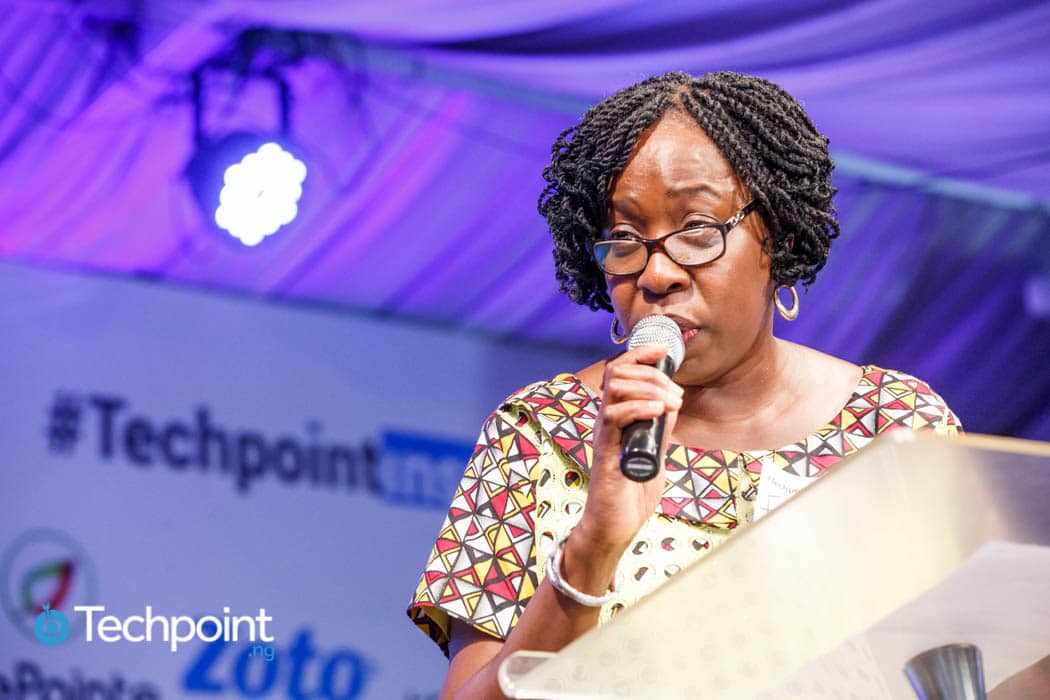
The other issue is, we have a very unorganised or chaotic marketplace in Nigeria. What do I mean by that? For anything you are trying to do, there are a thousand other people trying to do the same thing. Even if it costs a billion dollars, every idea from people who have absolutely no capacity to execute but have a brother in government or friend who knows something, to the people who genuinely have the capacity to execute, everybody’s is doing the same thing. So, it becomes very difficult and we are also a very big society where we don’t have a lot of formal structures.
So if you are growing a business you have to be very deliberate and you have to do your homework on who exactly has the capacity to buy, how much money do you need, where should you prioritise your efforts. That person who came yesterday and said, “let me introduce you to my brother the senator, the governor”, is that really how your business is going to grow? Or if you are trying to sell food products to consumers, you need to really go focus on how you get more of those consumers on your website so that they can actually buy those products.
So, because of the noise in the environment it tends to distract a lot of people and people tend to get derailed. So for us also, it was very important that we prioritise who are the big customers. Everybody says, “why don’t you do retail?”, “why don’t you sell to ISPs?”, “why don’t you sell to home consumers?” To do that, we have to make an investment of not $240 million but $2.4 billion dollars, which is 10 times what we have for any of the GSM companies that are being successful today.
Until we have that kind of capital lined up, and after you have four of them in the market, does it make sense to go after that space or it makes sense to go after the space where there’s not as much competition? So you really have to pay attention to the marketplace and what your role is and where you’re going to create value and get the impact you need to generate the cash to keep your business running.
Another one is the rule of law. You know, in Nigeria, it’s very difficult to enforce contracts. So, be it the supplier who’s supposed to come in 30 days who doesn’t come in 90 days, or the person whose said they will give you a service or build something for you by next week and the they don’t show up, or the customer that you deliver services to and then does not want to pay you your money. You have to, as they say, “shine your eyes” as you are doing business so that you are not making careless mistakes in terms of how you are engaging third-parties, what kind of commitments you make that they are enforceable and sustainable. Because a single commitment that is not properly executed could tear your business down and we’ve been very mindful of that in how we go about our businesses. We don’t sign bad contracts and we only sign contracts so we limit our risks to what we can actually afford, so that we don’t have big surprises.

Finally is the issue of enabling environment and I tell people after doing it, I think doing business in Nigeria is a lot more challenging than in other parts of the world. Now, of course, there are opportunities here, because we haven’t fully developed our society, that are not available elsewhere as well. So, it’s a risk-reward type of situation.
But when you look at the skills, if you are an employer of labour that you are hiring, when you look at things like even the capacity of your employees to get to work on time, on a rainy day in Lagos, when you look at the commitment.
I was in the office earlier this morning. One of my employees said to me, “I just wanted to let you know that I will be leaving in August because I have decided to go back for a masters in the United States” (of course looking for greener pastures), I said, “do you intend to come back?” He said, “no, my intention would be to seek employment after I get that degree”.
I wished him well and I thanked him for letting me know on time so we can plan to back-fill him. But it is a challenging environment and so the degree of instability, the degree of logistical challenge that the average entrepreneur faces in this society is quite daunting.
But then there are needs and the opportunity to make a difference. And I say to people, if I stayed in the United States, I would never have had the opportunity to build a submarine cable, to bring wholesale internet to all these people, to build the premiere data centre. There are so many big, better capitalised companies which are in a much better position to do that and build this kind of fundamental infrastructure.
Suggested Read: Inside MainOne’s top secret Data Centre in Lagos
So, it’s everything around us from tutoring, to education, all these areas that we talk about there’s certainly, with 180 million people in Nigeria, the opportunity to make a difference, to leave an imprint on the world. That’s why it’s worthwhile and interesting to be an entrepreneur here, not because it’s easier but, because the opportunities do exist and they are available to all of us as Nigerians to seize the moment and move forward.

Now, creating value is very fulfilling. Obviously you need to pay the bills. How much money you actually make is a different thing but, you know, it cannot just be motivated by money because, as I mentioned, it is a very difficult thing to be an entrepreneur here.
What I find is that you need to find your passion or something you can do better than everyone else. If you are going to win in these very noisy markets that we talked about, in this market where capital is hard to come by, it had better be something that you are prepared to keep doing when everybody else has given up. Or something you are going to keep refining and doing better than everyone else so that at the end of the day, you can distinguish yourself. There is just no way about it.
A lot of people (copy cats) just say, “so and so is doing it so I’m going to do it”. You don’t know what those challenges are, 3 to 6 months later, you are going to crumble. You really need to ensure that you are either better or committed to being better than everyone else, or you have a deep-seated passion and knowledge that you bring to that space so you can truly excel.
There would be challenges. So in addition to all the ones we’ve said, our environment is such that you step out every day, and there is a new challenge. Even for me — we are in the 7th year of operation and the 9th year of doing this business — I can tell you every day brings a challenge that is totally unanticipated. You say, “do I really have to deal with this now? Can I really cope with this challenge?” But then, if you give up, you never get the prize. So you have to keep going and you have to have a passion and a commitment to keep going.
The final thing I would say is don’t think that “successful entrepreneurs do not have challenges”. I don’t know anyone you can talk to, be it the Richard Bransons or the Bill Gates of this world, [that would say that].
One of the things that I like doing is reading biographies of other rich people. [I’ve read about] Steve Jobs, leaving Apple and having to come back from being fired by a board that he put together and the business really going down before they came back again.
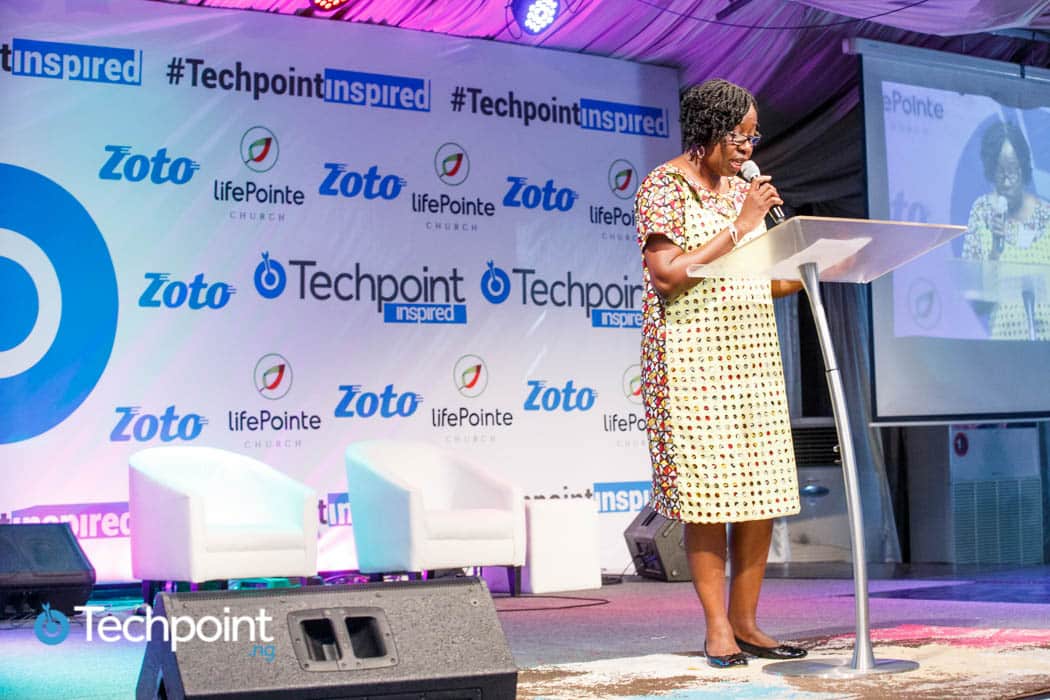
So one of the key things you have to realise is that it’s not that you will not have setbacks, it’s not that you will not have discouragements and it’s not that people who are successful in business have not experienced similar setbacks. It is that, at the end of the day, they persisted in achieving a vision, in the delivering a solution, in meeting a need better than anyone else and, ultimately, they were successful.
Thank you very much.

